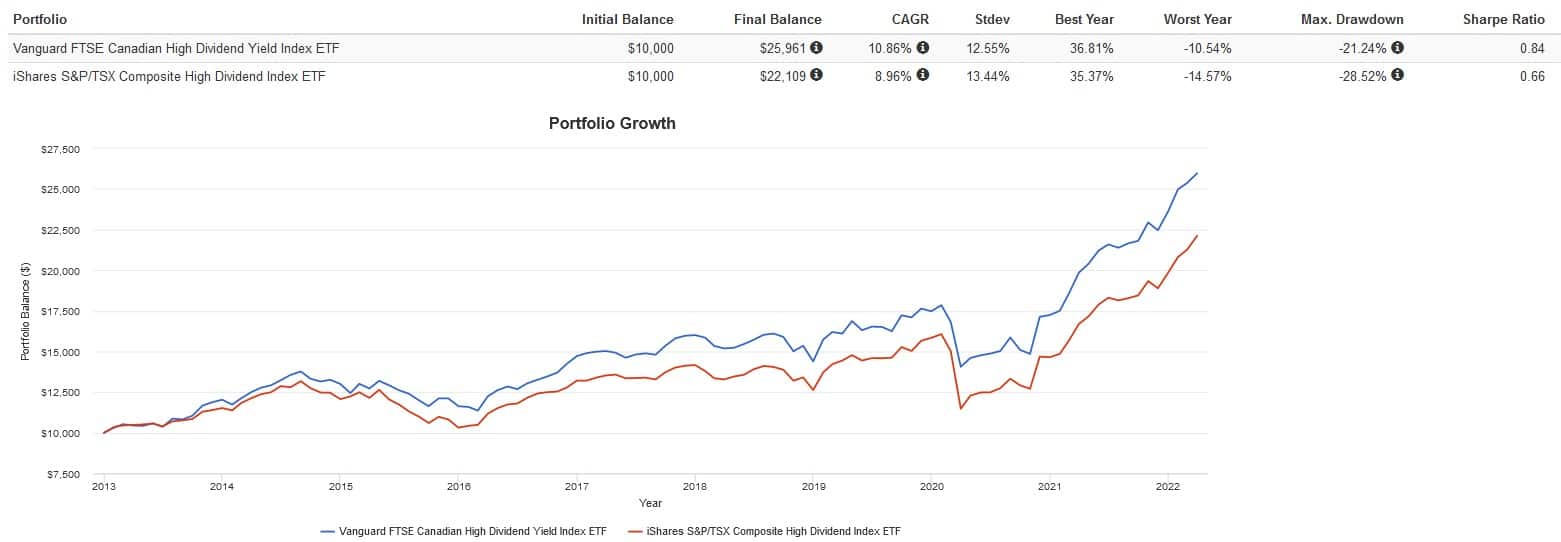Welcome to a weekly series where I break down and compare some of the most popular exchange-traded funds (ETFs) available to Canadian investors!
Canadian investors taking a passive approach to buying high dividend paying stocks can pick their own, but an easier and more hands-off approach is through using an ETF. Both BlackRock and Vanguard provide a set of low-cost, high-liquidity ETFs that offer exposure to a portfolio of great dividend stocks.
The two tickers up for consideration today are iShares S&P/TSX Composite High Dividend Index ETF (TSX:XEI) and Vanguard FTSE Canadian High Dividend Yield Index ETF (TSX:VDY). Which one is the better option? Keep reading to find out.
XEI vs VDY: fees
The fee charged by an ETF is expressed as the management expense ratio (MER). This is the percentage that is deducted from the ETF’s net asset value (NAV) over time, calculated on an annual basis. For example, an MER of 0.50% means that for every $10,000 invested, the ETF charges a fee of $50 annually.
XEI has an MER of 0.22%, identical to that of VDY at 0.22%. The ETFs are therefore tied when it comes to their fees. That being said, Vanguard does have the better track record of lowering fees on their ETF lineup owing to their “investor first” philosophy.
XEI vs VDY: size
The size of an ETF is very important. Funds with small assets under management (AUM) may have poor liquidity, low trading volume, high bid-ask spreads, and more risk of being delisted due to lack of interest.
XEI currently has AUM of $1.76 billion, whereas VDY has AUM of $1.77 billion. Both are virtually identical and are more than sufficient for a buy-and-hold investor. Again, it’s a tie here.
XEI vs VDY: holdings
XEI tracks the S&P/TSX Composite High Dividend Index, which holds a total of 75 stocks. The majority of the ETF is concentrated in the energy (30.36%), financials (29.46%), telecommunications (14.81%), and utilities (13.96%) sectors. The current distribution yield is 3.51%.
VDY tracks the FTSE Canadian High Dividend Yield Index, which holds a total of 39 stocks. The majority of the ETF is concentrated in the financials (57.1%), energy (24.2%), telecommunications (8.3%), and utilities (5.4%) sectors. The current distribution yield is 3.41%.
XEI vs VDY: historical performance
A cautionary statement before we dive in: past performance is no guarantee of future results, which can and will vary. The portfolio returns presented below are hypothetical and backtested. The returns do not reflect trading costs, transaction fees, or taxes, which can cause drag.
Here are the trailing returns from 2013 to present:

Here are the annual returns from 2013 to present:

VDY outperformed XEI over the last few years. I attribute this to VDY’s higher concentration of Big 6 bank stocks, which posted amazing earnings, revenues, and dividend increases in the last decade. Still, sectors are cyclical, and XEI has been outperforming so far in 2022 thanks to its higher concentration of energy stocks.
The Foolish takeaway
If I had to choose one ETF to buy and hold, it would be XEI. Both ETFs have identical MERs and AUMs, but VDY is too concentrated in the TSX financials sector for my liking. Although the Big 6 banks have done well, I’m personally not comfortable with taking on concentration risk, so XEI is the better, more diversified option in my opinion. Still, if you’re partial to Vanguard and like over-weighting the financials sector, VDY is an excellent pick as well.







